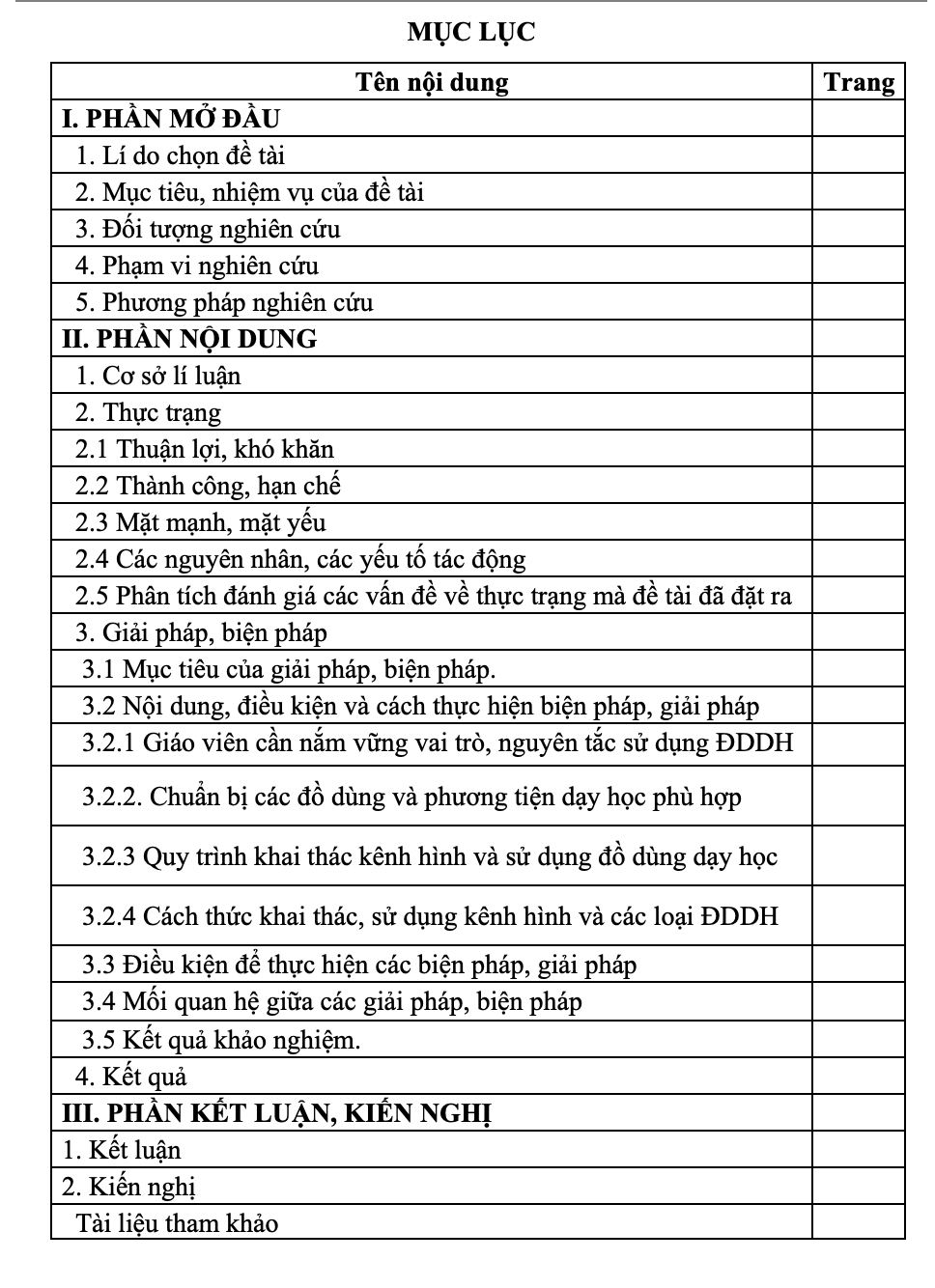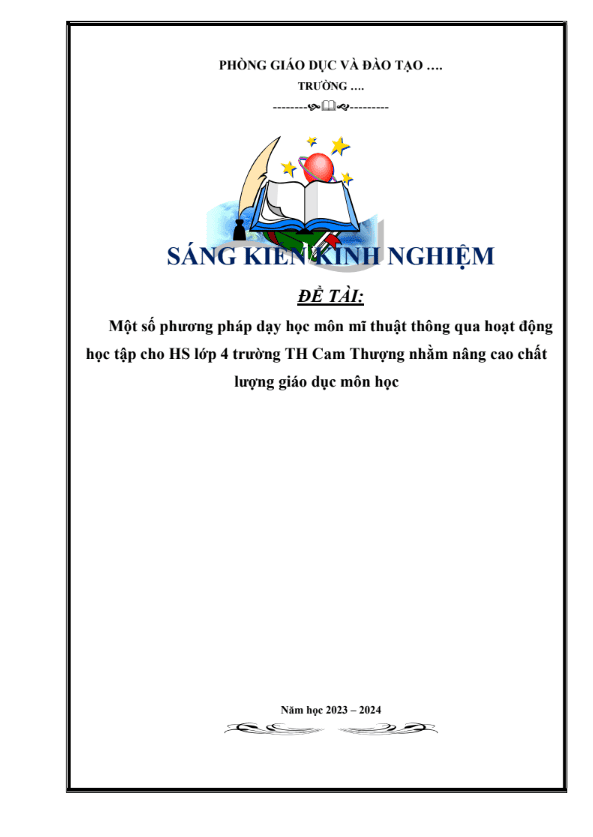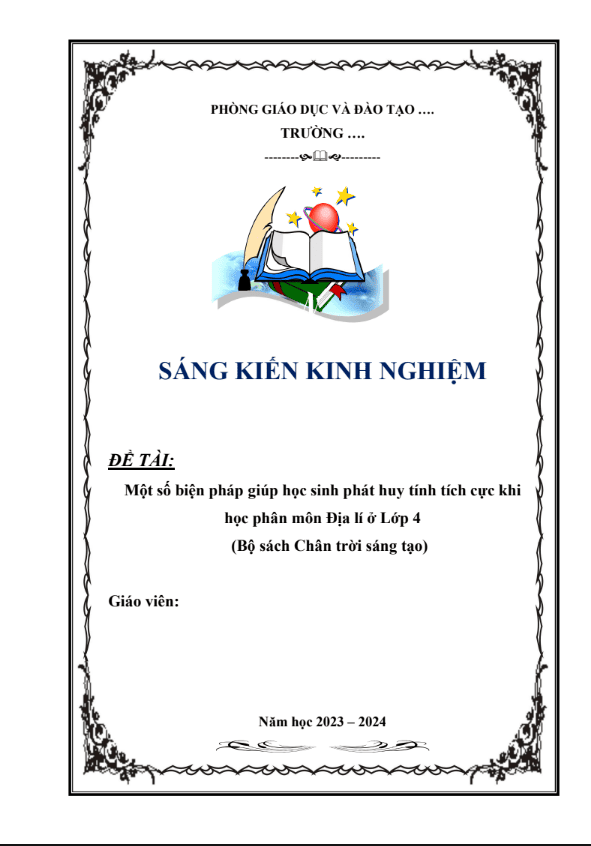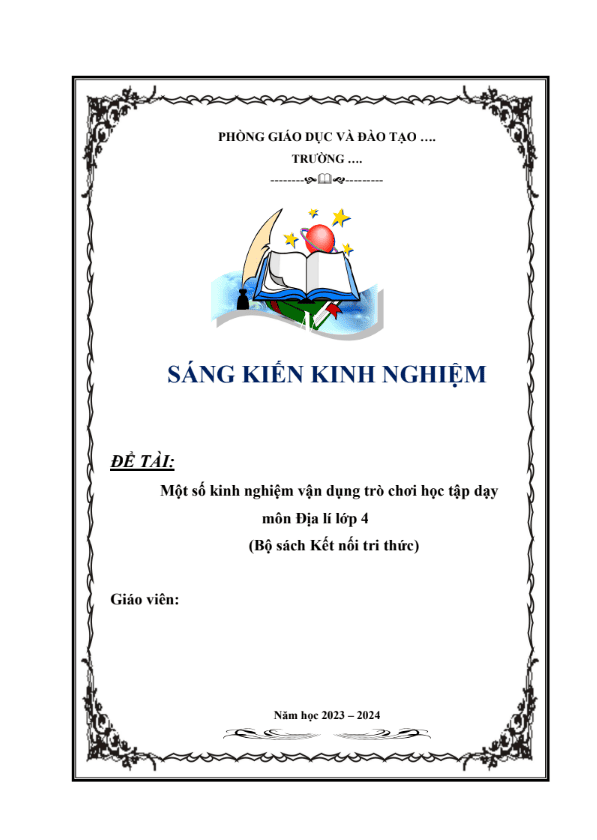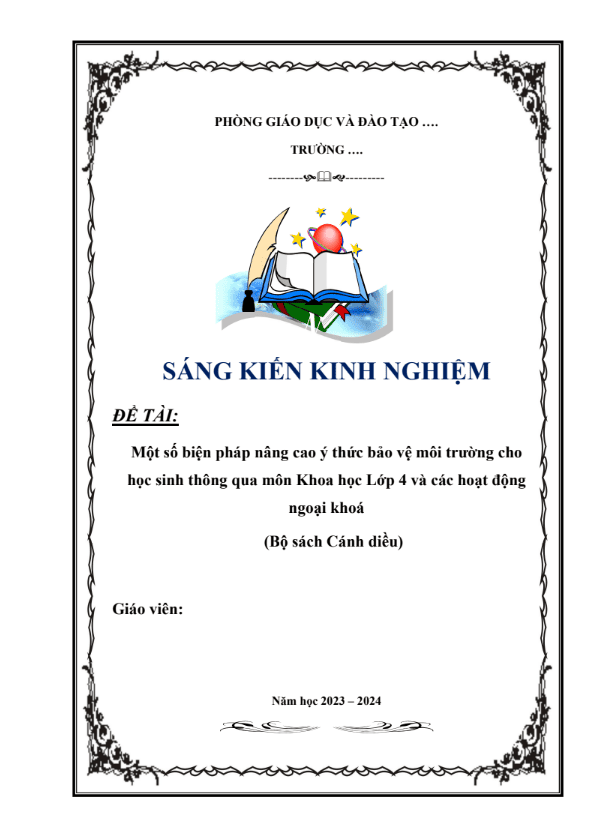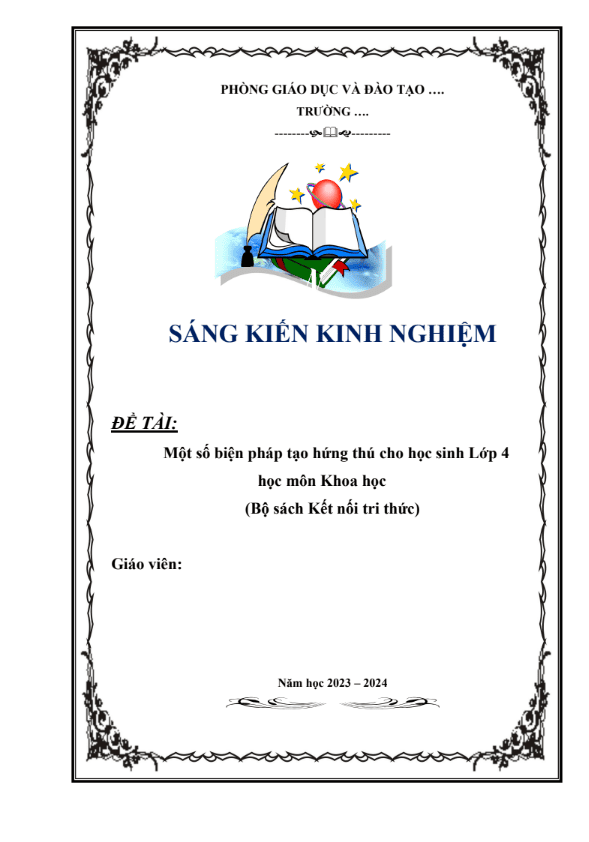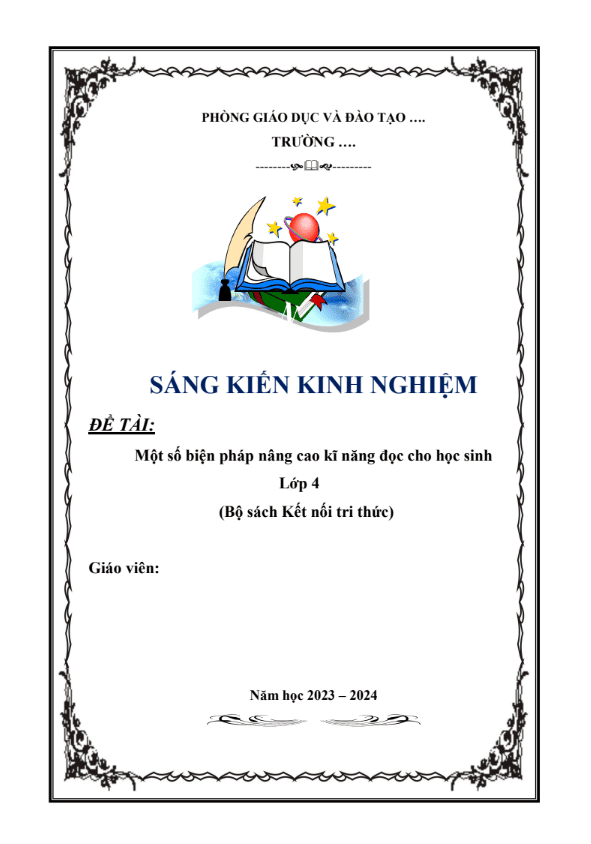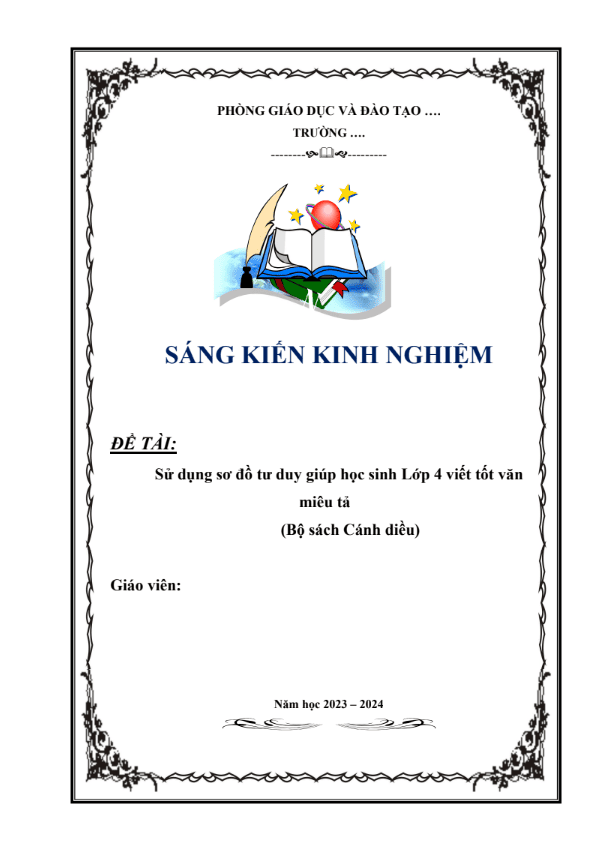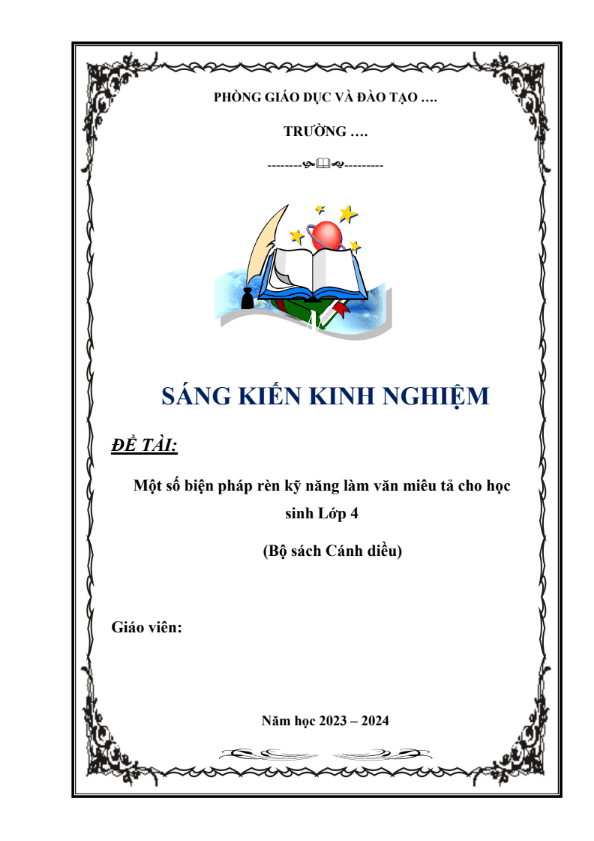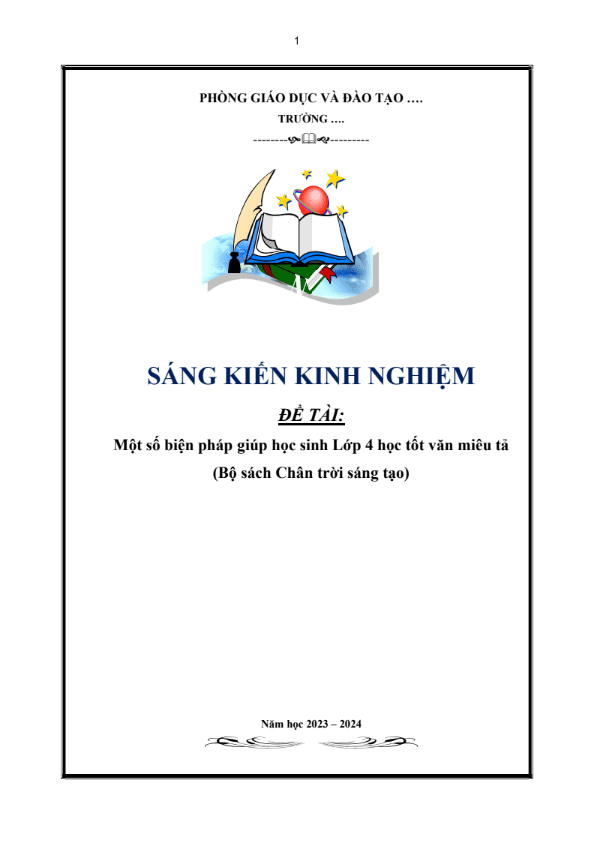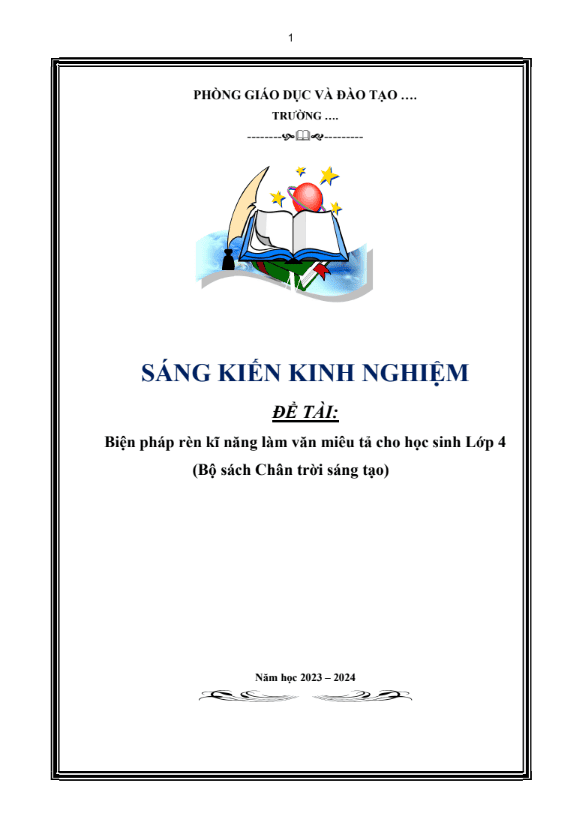SKKN Một số kinh nghiệm khai thác kênh hình sách giáo khoa và sử dụng ĐDDH trong môn Tiếng Anh lớp 4
- Mã tài liệu: BM4081 Copy
| Môn: | Tiếng anh |
| Lớp: | 4 |
| Bộ sách: | |
| Lượt xem: | 834 |
| Lượt tải: | 6 |
| Số trang: | 36 |
| Tác giả: | Lê Thị Thu Trang |
| Trình độ chuyên môn: | Thạc sĩ giáo dục |
| Đơn vị công tác: | Trường Tiểu học Trần Văn Ơn |
| Năm viết: | 2021-2022 |
| Số trang: | 36 |
| Tác giả: | Lê Thị Thu Trang |
| Trình độ chuyên môn: | Thạc sĩ giáo dục |
| Đơn vị công tác: | Trường Tiểu học Trần Văn Ơn |
| Năm viết: | 2021-2022 |
Sáng kiến kinh nghiệm “SKKN Một số kinh nghiệm khai thác kênh hình sách giáo khoa và sử dụng ĐDDH trong môn Tiếng Anh lớp 4” triển khai gồm các biện pháp nổi bật sau:
Biện pháp 1: Tạo hứng thú cho học sinh trước khi nghe bằng các trò chơi (cho phần Pre-listening activities).
Biện pháp 2: Tạo hứng thú cho học trước khi nghe bằng hoạt động hỏi và trả lời (Questioning and answering).
Biện pháp 3: Tạo hứng thú cho học sinh trước khi nghe bằng hoạt động đóng vai theo tình huống (Pre-listening activities).
Mô tả sản phẩm
- INTRODUCTION
1.1. Reason for choosing the topic
These days, our country has been in the integration process and co-operation with many other countries and English is regarded as a global language in communication. Therefore, we can see the importance of learning English. For Vietnamese students, who are the future generation of the country, learning English becomes even more necessary than ever. English is also mandatory graduation exam levels. But in Vietnam teaching and learning English are still issues that cause headache education matters such as how to find a standard method of learning English to help children progress faster?, why many students who have learnt English for more than ten years even that after they left school, cannot use the English competently?, etc. The educational system of Vietnam has taken English as a compulsory subject at school from primary school years. English in primary schools is the subject that combines all the skills. It is not too difficult in term of knowledge but for primary students, the concept of words, sentences, wording of the mother tongue is vague for them, so they find the concept of speech, pronunciation, writing, memorizing vocabulary … of a foreign language too complex.
I have been a teacher of English for nine years and taken part in many workshops and courses on teaching English for kids. I always try to find best ways to make my students interested in learning English and find it easier. What are difficulties for kids in learning English? In my opinion, they are remembering words and structures and using them for communicating naturally. Thanks for many techniques as “rub out and remember”, “what and where”, “matching” or using songs, chants, so on, kids can remember words and structures but how to use them to practice in a natural way and improve the speaking skill effectively? How to help them form and develop the comprehensive study skills? How to help children love, inculcate knowledge of foreign culture, grasp and absorb it most effectively? That is why the research into ways to help school students acquire the full, deep remembering English vocabulary and using it is quite necessary and important for primary students. And I would like to introduce my experienced study that is “Some experiences on guiding grade 4 students to create poems as a technique to improve the English skills”.
- Aim of the study
The study is carried out to show the benefits of teaching kids how to use English words and structures to create/write and read simple poems to help them develop the English skills to gain communicative approach in teaching and learning English. The rationale behind the package is that students will have ample opportunities to enrich their English learning experience and extend a range of language abilities through exploring poems. Carefully designed and sequenced, the materials and activities in this package aim to: strengthen students’ skills of understanding and appreciating the themes, structures, features and language in a range of poem; help students to respond to and give expression to the imaginative ideas, moods and feelings expressed in poems and songs through written, oral and performance means and enable students to apply the knowledge and skills they have learned in their own creative production and critical appreciation of poems.
- The object of the study
The grade 4 students are the ones that have a certain number of English vocabularies, their ways of learning English are formed and they can make simple English conversations. Vocabularies in English 4 textbook are various so creating poems give them an opportunity to improve and develop English skills.
- Method of the study
To obtain the effects of the mentioned aim, I have studied documents from the methodology course on techniques to teach kids English. Then I read, analyzed and synthesized the textbook and reference books, made plans on what to do basing on the grade 4 students’ psychology and language ability.
- DEVELOPMENT
- Literature view
- What is a poem?
A poem is a piece of writing in which the words are chosen for their beauty and sound and carefully arranged, often in short lines in rhyme. Free verse is a modern form of poetry that does not follow any specific rhyme or metrical scheme, although it does not completely abandon the basic poetic precepts of heightened language and sonics. Through poems, people can show their emotions, feelings, thoughts, looks, etc.
We may have misunderstanding between poems and chants. A chant is the rhythmic speaking or singing of words or sounds, often primarily on one or two main pitches called reciting tones. Chants may range from a simple melody involving a limited set of notes to highly complex musical structures, often including a great deal of repetition of musical subphrases. And we often say “Sing chants” but “Read poems”. Rhythm of a poem is slow and softly strengthened so it is easy to read.
Poetry is characterized by the following:
– Lines
– Syllables
– Rhythm (and beat)
– Rhyme
– Images
– Alliteration
- Reasons why creatingEnglish poems should be used in taught and learnt
There have been positive remarks by scholars who consider poetry an effective tool for multi-skill development in language learning. According to Hess (2003), through its drama and emotional context, a good poem is suitable for a close “reading”, with much good language practice. Hedge (2000) also believes poems as authentic materials can be used to develop especially the receptive skill of reading. Another claim is that reproduction of poetry – memorizing, rewriting, reporting and translating – can exercise the productive skill of “writing”, which is not an easy task to teach (Alber-Morgan Sheila; Hessler, & Konrad, 2007). When considered in terms of the skill of “speaking”, as the themes of poetry (e.g. love, death, nature, beliefs, despair etc.) are universal among all human beings (Maley & Duff, 1989), and because each person’s perception is different, poems can initiate a fund of interactive discussion and create the atmosphere for a genuine exchange of ideas. Besides, poetry can also be a very good way to help children understand the “phonics of English” and work with rhyming words (Collins, 2008). Along with the skills development, the memorability feature of a poem can support the natural ability to unconsciously absorb language, which enables the learner to “retrieve grammatical and lexical information” when needed (Ainy, 2008).
Most of Vietnamese people think that creating poems is very difficult because it is considered as a style of art that requires creation and literature aesthetic values. In some cases, that is not completely true. Creating simple poems is very entertaining to deal with while students constantly work on all skills simultaneously, even though they are not conscious about it sometimes. Poems’ structure makes them easy to read while its rhyme makes them extremely memorable. On top of that poems provoke people to express their personal opinion which is great for working on speaking. In many countries where English is used as the second language, poetry plays an important role in teaching four basic language skills like reading, writing, listening and speaking.
Poems are authentic texts. This is a great motivator. Learning becomes stimulating and fun. Poems present a wide range of learning opportunities. Kids can learn the four skills, practice specific language structures, pronunciation and grammar. Reading poems loud can make significant gains in students’ oral reading fluency. When writing/ creating poems, kids have
TÀI LIỆU LIÊN QUAN
- 0
- 155
- 1
- [product_views]
- 6
- 163
- 2
- [product_views]
- 8
- 188
- 3
- [product_views]
- 3
- 125
- 4
- [product_views]
- 5
- 118
- 5
- [product_views]
- 8
- 110
- 6
- [product_views]
- 7
- 116
- 7
- [product_views]
- 0
- 188
- 8
- [product_views]
- 5
- 192
- 9
- [product_views]
- 1
- 187
- 10
- [product_views]

